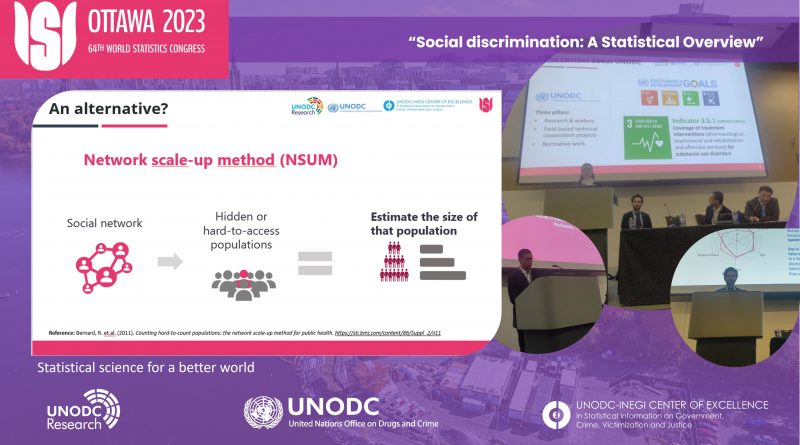UNODC participates in the 64th ISI World Statistics Congress (WSC) 2023 in Ottawa, Canada
Ottawa, Canada. From 16 to 20 July, the UNODC-INEGI Center of Excellence attended the 64th ISI World Statistics Congress (WSC) 2023 and participated as a speaker in the Invited Paper Session “Social discrimination: A Statistical Overview”, to share the statistical methods used by the United Nations Office on Drugs and Crime (UNODC) to overcome stigmatization of drug users in data collection. This session was organized by the Mexican National Institute of Statistics and Geography (INEGI) vice-presidency, and the agenda included speakers from INEGI General Directorate of Crime and Justice Statistics, the Officer of the High Commissioner on Human Rights (OHCHR) and UNODC. The objective of the session was to review experiences about production and value of high-quality data on discrimination from global and national perspectives.
During the session, Luisa Sánchez-Iriarte, Researcher on Crime and Justice of the UNODC-INEGI Center of Excellence, presented an overview on the world drug problem and how the stigmatization of drug users is a major barrier to effective data collection on drug use. This is because drug users are often reluctant to disclose their drug use to researchers, for fear of being judged or discriminated against. As a result, data on drug use is often inaccurate and incomplete.
The presentation served as a space to explain that one way to overcome the stigmatization of drug users in data collection through drug use surveys is to use the Network Scale-Up Method (NSUM): an indirect method to calculate drug use prevalence. NSUM is a statistical method that uses information about the social networks of survey respondents to estimate the prevalence of drug use in a population.
The UNODC provides technical assistance to Member States to measure drug prevalence in the population. Under this principle, UNODC has also developed several tools and resources to help countries, researchers and policymakers collect accurate and complete data on drug use. A Manual on Drug Use Surveys is also under development and will be available in 2024.
For more information on drug use prevalence and recommended methodologies to measure it, visit:
- United Nations Office on Drugs and Crime (2023). World Drug Report 2023
- United Nations Office on Drugs and Crime (2003). Estimating Prevalence: Indirect Methods for Estimating the Size of the Drug Problem (United Nations, 2003)
- Bernard, R. et.al. (2011). Counting hard-to-count populations: the network scale-up method for public health



